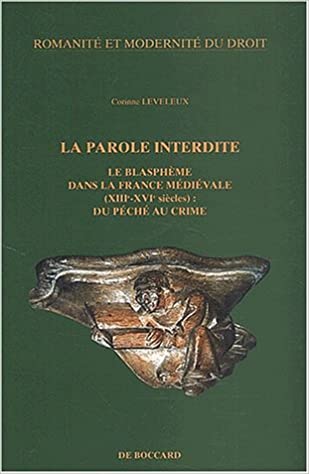 Professor Corinne Leveleux-Teixeira spent two months at the Robbins Collection conducting re–search on oaths in the middle ages. She spent her time collecting material for a book on oaths in the middle ages. Other scholars have studied oaths during this time period, but usually with a political lens. It was the linguistic and social elements of oaths that drew Professor Leveleux-Teixeira to the topic. In the middle ages people gave oaths while signing contracts, during trial, and many other day-to-day activities that required some sort of guarantee. “When you wanted a sure thing, an oath was all you had. It established a truth that could not be invalidated,” said Professor Leveleux-Teixeira. How did oaths work? Why were oaths so important to people in the middle ages? These were just some of the questions that Professor Leveleux-Teixeira set out to answer with this research trip, her fourth, to the Robbins Collection.
Professor Corinne Leveleux-Teixeira spent two months at the Robbins Collection conducting re–search on oaths in the middle ages. She spent her time collecting material for a book on oaths in the middle ages. Other scholars have studied oaths during this time period, but usually with a political lens. It was the linguistic and social elements of oaths that drew Professor Leveleux-Teixeira to the topic. In the middle ages people gave oaths while signing contracts, during trial, and many other day-to-day activities that required some sort of guarantee. “When you wanted a sure thing, an oath was all you had. It established a truth that could not be invalidated,” said Professor Leveleux-Teixeira. How did oaths work? Why were oaths so important to people in the middle ages? These were just some of the questions that Professor Leveleux-Teixeira set out to answer with this research trip, her fourth, to the Robbins Collection.

Professor Corinne Leveleux-Teixeira first came to the Robbins Collection in 1995 when she was a PhD student from France studying blasphemy. “In those two months, I did more work than I could have in two years in France,” she said. Coming to the Robbins Collection as a young scholar also gave Professor Leveleux-Teixeira an international perspective, since there were several other early-career fellows at the Robbins Collection at the same time.What she found in her research was not at all what she expected. Although blasphemy was written about as a serious crime previous to the 16th century, the only real punishment seemed to be small fines. It wasn’t until the 16th century that Catholics began to use blasphemy as a suppressive tool against Protestants. In 2001 she published her book La parole interdite: Le blasphème dans la France médiévale (XIIIe-XVI siècles), which largely comes from the research she did during her time spent at the Robbins Collection.
Professor Leveleux-Teixeira’s previous work on blasphemy brought her to her current work on oaths. Until the 12th and 13th century, blasphemies were called “bad oaths.” After the 13th century, blasphemy was specified as a crime, separate from the concept of an oath. The study of blasphemy and oaths allows Professor Leveleux-Teixeira to explore the relationship between laws and language, since both are about what people say and promise to each other.